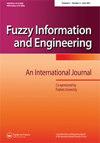Evaluating the Efficiency of Decision Making Units in Fuzzy two-stage DEA Models
IF 1.3
Q2 MATHEMATICS, APPLIED
引用次数: 1
Abstract
Data envelopment analysis (DEA) is an optimization method to assess the efficiency of decision-making units with multiple-inputs/multiple-outputs assumption. Most real-life issues contain more than one stage unit which needs multiple-stage data envelopment analysis models to be solved. Moreover, the inputs and outputs of the units are rarely measured accurately in real-life problems, hence fuzzy data envelopment analysis approaches can be significantly helpful in calculating efficiency scores. In this study, an approach for evaluating the performance of decision-making units (DMUs) in fuzzy two-stage DEA models is developed. The developed model is a parametric program based on alpha-cuts. The dependence on alpha allows the manager to compare and rank DMUs based on his/her degree of certainty and after the selection of alpha, our proposed model becomes linear. Furthermore, a theorem is proposed and proved for conventional multiplicative two-stage DEA models with the assumption of Variable Returns to Scale. This theorem can be used to evaluate the correctness of the results. Finally, by two illustrative examples, the ability of the proposed approach to solve fuzzy two-stage DEA models is shown, and the obtained results are compared to that of some other methods in this field.模糊两阶段DEA模型中决策单元效率的评价
数据包络分析(DEA)是一种在多输入/多输出假设下评估决策单元效率的优化方法。大多数现实问题包含多个阶段单元,需要多级数据包络分析模型来解决。此外,在现实问题中,单元的输入和输出很少被准确测量,因此模糊数据包络分析方法可以在计算效率分数方面有很大帮助。本文提出了一种模糊两阶段DEA模型中决策单元绩效评价方法。所开发的模型是一个基于α -切割的参数化程序。对alpha的依赖允许管理者根据他/她的确定性程度对dmu进行比较和排序,在选择alpha之后,我们提出的模型变成线性的。在此基础上,提出并证明了传统乘式两阶段DEA模型在变规模收益假设下的一个定理。这个定理可用来评价结果的正确性。最后,通过两个实例验证了该方法求解模糊两阶段DEA模型的能力,并将所得结果与该领域的其他方法进行了比较。
本文章由计算机程序翻译,如有差异,请以英文原文为准。
求助全文
约1分钟内获得全文
求助全文
来源期刊

Fuzzy Information and Engineering
Mathematics-Logic
CiteScore
2.30
自引率
0.00%
发文量
13
审稿时长
40 weeks
期刊介绍:
Fuzzy Information and Engineering—An International Journal wants to provide a unified communication platform for researchers in a wide area of topics from pure and applied mathematics, computer science, engineering, and other related fields. While also accepting fundamental work, the journal focuses on applications. Research papers, short communications, and reviews are welcome. Technical topics within the scope include: (1) Fuzzy Information a. Fuzzy information theory and information systems b. Fuzzy clustering and classification c. Fuzzy information processing d. Hardware and software co-design e. Fuzzy computer f. Fuzzy database and data mining g. Fuzzy image processing and pattern recognition h. Fuzzy information granulation i. Knowledge acquisition and representation in fuzzy information (2) Fuzzy Sets and Systems a. Fuzzy sets b. Fuzzy analysis c. Fuzzy topology and fuzzy mapping d. Fuzzy equation e. Fuzzy programming and optimal f. Fuzzy probability and statistic g. Fuzzy logic and algebra h. General systems i. Fuzzy socioeconomic system j. Fuzzy decision support system k. Fuzzy expert system (3) Soft Computing a. Soft computing theory and foundation b. Nerve cell algorithms c. Genetic algorithms d. Fuzzy approximation algorithms e. Computing with words and Quantum computation (4) Fuzzy Engineering a. Fuzzy control b. Fuzzy system engineering c. Fuzzy knowledge engineering d. Fuzzy management engineering e. Fuzzy design f. Fuzzy industrial engineering g. Fuzzy system modeling (5) Fuzzy Operations Research [...] (6) Artificial Intelligence [...] (7) Others [...]
 求助内容:
求助内容: 应助结果提醒方式:
应助结果提醒方式:


